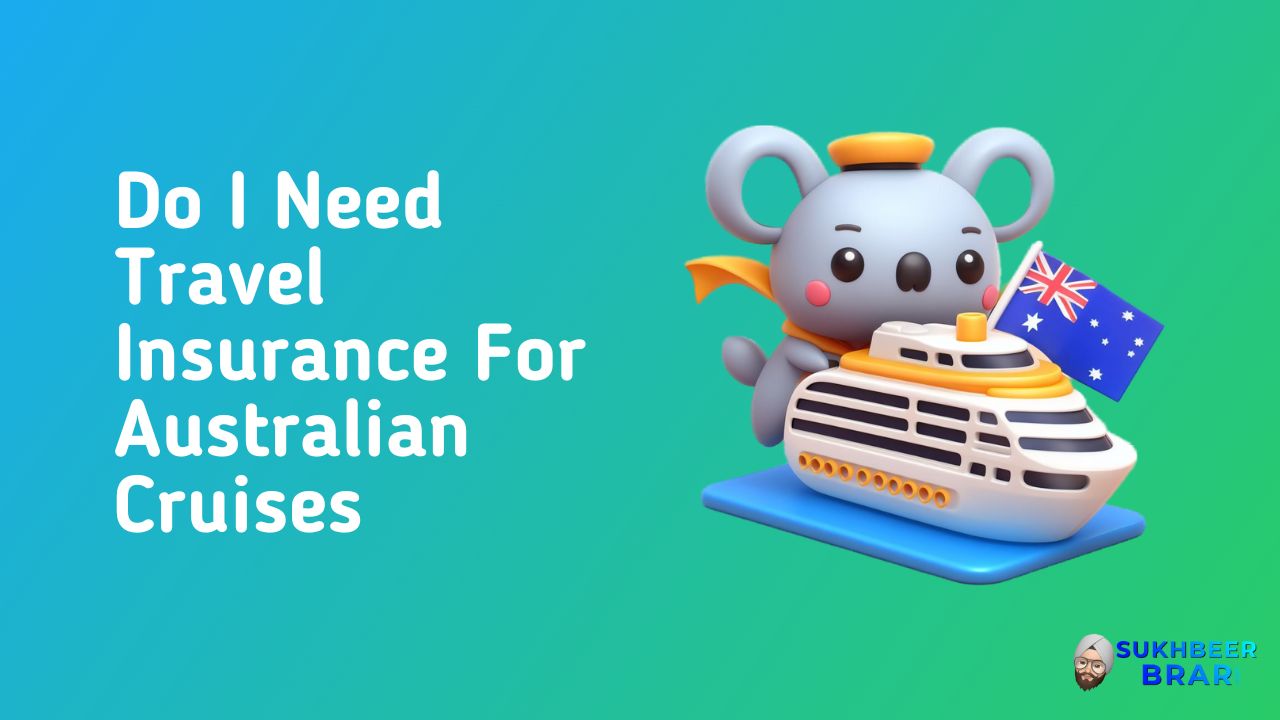Over 2 million Australians take a cruise each year. While cruising seems like a worry-free vacation, accidents and illnesses can happen even at sea.
Travel insurance can provide financial protection if something goes wrong on your cruise. But do you really need it? Keep reading to learn what travel insurance covers for cruises, what it costs, when to buy it, and if the cruise line’s coverage is enough.
Types of Coverage
When looking for travel insurance for an Australian cruise, there are four main types of coverage to consider:
Medical expenses
This covers any medical treatment you may need while on your cruise, including doctor’s visits, hospitalization, prescriptions, and emergency dental care. It reimburses you for any out-of-pocket medical expenses. Most policies have limits ranging from $50,000 to $1 million.
Evacuation/repatriation
If you get seriously ill or injured on your cruise and need to be evacuated to a medical facility onshore, this will cover the transportation costs. It may also cover the cost of getting you home after treatment.
Trip cancellation
This provides reimbursement if you need to cancel your cruise for covered reasons, such as illness, injury, or death of a family member. It repays the non-refundable parts of your trip.
Baggage loss
If your luggage is damaged, lost, or stolen during your cruise, this reimburses you for the contents. There are often limits on high-value items like jewelry and electronics.
Benefits of Travel Insurance for Australian Cruises
Purchasing travel insurance for an Australian cruise provides several key benefits that can give you peace of mind on your vacation.
Medical Coverage
One of the most important benefits is emergency medical coverage. If you fall ill or get injured during your cruise, travel insurance will cover the cost of doctor visits onboard the ship as well as medical evacuation to a hospital if needed. This takes the stress out of experiencing a medical issue far from home.
Trip Cancellation
Many travel insurance policies also allow you to cancel your trip for a covered reason and receive a refund of your cruise fare. This means that if you have to cancel due to injury, illness, death of a family member, jury duty, or other covered situation, you can get your money back instead of losing the entire non-refundable fare. This provides flexibility if life throws you an unexpected curveball before your trip.
Lost/Damaged Possessions
Additionally, travel insurance will reimburse you if your luggage is lost, damaged, or stolen during your cruise. It will also cover the loss or damage of other personal possessions. This gives you peace of mind that you won’t be out a lot of money if something happens to your belongings.
Purchasing a comprehensive travel insurance policy for an Australian cruise provides protection and flexibility in case you need to cancel or experience any covered losses or emergencies during your vacation. The benefits can give you peace of mind when cruising.
Cost of Travel Insurance for Australian Cruises
The cost of travel insurance for an Australian cruise can vary greatly depending on the trip details and level of coverage selected. However, some general estimates can provide an idea of what to expect.
The average price for a basic travel insurance policy for an Australian cruise ranges from $100 to $250 for a single traveler. A couple can expect to pay between $150 and $400 for a basic policy. Prices go up incrementally for families, with estimates of $250 to $600 for two adults and two children.
Several main factors determine the overall cost of travel insurance for a cruise:
- Length of trip – Longer cruises that have you away from home for many weeks will cost more to insure than a short one-week cruise. Each additional travel day adds to the price.
- Destination – Where your cruise is traveling to plays a role. International cruises are more expensive to insure than domestic trips staying along the Australian coastline.
- Age – Older travelers usually pay a higher rate, especially once over the age of 70.
- Pre-existing medical conditions – Declaring any pre-existing conditions will increase the cost and availability of coverage.
- Type of cabin – An expensive suite will cost more to insure than an interior cabin in case of cancellation.
- Added coverage – Upgrading from basic emergency medical to more comprehensive plans increases the price. Add-ons like cruise interruption or rental car damage can also add cost.
Some ways to potentially lower the cost are increasing deductibles, foregoing cancellation coverage, or looking for group discounts. Comparing quotes from multiple providers is the best way to find an optimal rate.
Read Also: Is Travel Insurance Worth It For International Travel?
Providers
When looking for travel insurance for an Australian cruise, some of the top providers to consider are:
- TravelGuard – TravelGuard is part of AIG and offers a range of plans specifically for cruises. They have a Cruise plan that covers trip cancellation, interruption, delays, medical expenses, evacuations, and more.
- Allianz – Allianz Travel Insurance offers comprehensive cruise coverage options. Their Cruise Vacation plan covers cancellation, delays, medical emergencies, evacuations, lost baggage, and other protections.
- Trawick – Trawick International has a Safe Harbor Cruise plan that includes coverage for medical emergencies, trip cancellation/interruption, missed port, and financial default of the cruise line.
- Seven Corners – Seven Corners provides roundtrip travel medical insurance for cruises. Their plans cover emergency medical and dental expenses, evacuations, trip delays, and 24/7 travel assistance.
When selecting a provider, compare plans and costs to find the right cruise travel insurance for your specific needs and budget. Look for comprehensive coverage with upgrades for cancel for any reason or other enhancements.
Exclusions
Travel insurance policies for Australian cruises typically exclude coverage for certain situations. Here are some of the most common exclusions to be aware of:
Pre-Existing Medical Conditions
Most policies will not cover claims related to pre-existing medical conditions. This includes any illness, disease, or injury you had signs or symptoms of during the 60-180 days prior to your policy purchase date. Make sure to disclose any pre-existing conditions when applying.
High Risk Activities
Injuries or incidents stemming from high risk activities like scuba diving, rock climbing, mountain biking, etc are usually excluded. Adventure sports and other hazardous pursuits will not be covered.
Mental/Nervous Disorders
Expenses related to mental or nervous health disorders like anxiety, depression, neurosis, psychosis, or others are typically excluded from coverage. This includes medical treatment, prescriptions, hospitalization, and more.
Claim Process
When you need to make a claim on your travel insurance policy for an incident that occurred during your Australian cruise, follow these steps:
Report the claim as soon as possible. Notify your travel insurance provider within 24 hours if possible, or at least within 72 hours. Reporting promptly can help move the claims process along faster.
Gather documentation. Your insurer will require documentation to process your claim. This may include receipts for expenses you incurred, police reports if relevant, statements from the cruise line, and proof of travel dates. Having this paperwork ready will help avoid delays.
Complete claim forms. Your insurer will provide the necessary claim forms to fill out. Supply all details requested, such as your policy information, a complete account of what happened, expenses you are claiming, and any relevant documentation. Sign any claim forms where required.
Provide additional information if requested. The claims adjuster may request supplementary information during the review process. Be responsive to any additional documentation or details sought to facilitate quick processing of your claim.
Receive claim decision. After reviewing all documentation and details, your insurer will reach a decision on your claim. If it is approved, you will receive reimbursement according to your policy limits. If it is denied, ask for an explanation in writing.
Appeal if necessary. If you feel your claim was wrongly denied, you can provide additional information and request an appeal from the insurer. Sometimes supplying clarification or corrections can lead to a reversal on the claim decision.
Cruise Line Coverage
Cruise lines provide some basic coverage for passengers, but there can be significant gaps that third party travel insurance can fill.
- Cruise lines generally cover only basic medical care from the ship’s doctor or medical facility. They will often stabilize a passenger medically and evacuate if necessary, but cruise line coverage may not extend to costs once back on land.
- Cruise lines do not cover costs like emergency medical transportation from the ship to a hospital, which can easily run into the tens of thousands of dollars. They also do not cover any prescriptions or additional medical care once the cruise is over.
- Trip cancellation from unexpected events is generally not included in cruise line policies. Travel insurance can provide reimbursement for lost non-refundable deposits and payments if a trip needs to be canceled for covered reasons like illness or injury.
- Most cruise lines do not cover trip interruptions either. If you need to fly home early from a cruise, travel insurance can cover new airline tickets, hotels, meals, and other unexpected costs.
- Lost baggage and travel delays are typically not covered by cruise lines. Baggage and travel delay benefits in a 3rd party policy can provide reimbursement for necessities if bags are lost or travel plans disrupted.
- Travel insurance can also provide coverage the cruise line doesn’t for missed port calls, shore excursions, and other travel mishaps.
So while cruise lines offer some basic protection, important gaps remain that travel insurance is designed to fill. Comprehensive policies provide key medical, evacuation, cancellation, interruption, and travel delay benefits to cruising passengers.
When to Buy Travel Insurance for an Australian Cruise
The best time to purchase travel insurance for an Australian cruise is as soon as you book your trip. This ensures you are covered in case you need to cancel or postpone your cruise before departure.
Most travel insurance providers recommend buying a policy within 14 days of your initial trip deposit to be covered for pre-existing medical conditions. However, the sooner you buy travel insurance after booking your cruise, the better.
You’ll also want to buy travel insurance before making your final trip payment, as most policies exclude coverage for “financial default.” This means if the cruise line goes bankrupt after you pre-pay in full, your travel insurance would not reimburse you. Buying insurance early on provides financial security in case the unexpected occurs.
In addition, factors like your age and health history may impact when you need to buy travel insurance and which policy is right for you. Older travelers and those with pre-existing medical conditions often need to buy policies within a set period after making a deposit. This “look-back period” can vary by insurance company.
The best practice is to purchase travel insurance as soon as you confirm your Australian cruise to lock in coverage for your particular situation. Don’t wait until the last minute to buy insurance to avoid potential gaps in coverage.
Conclusion
Leaning on travel insurance when cruising Australian waters comes down to your tolerance for risk. While Australia is a highly developed country with strong safety standards and convenient access to medical care, there’s still potential for unexpected incidents to disrupt an otherwise enjoyable cruise vacation.
Ultimately, travel insurance provides important financial protection for major trip costs like medical care abroad, evacuation, lost baggage, and trip cancellation. It can make sense for risk-averse travelers or those with serious health conditions. That said, it may be an unnecessary expense for healthy travelers who are comfortable assuming some financial risks.
If you do opt to purchase travel insurance for an Australian cruise, make sure to understand exactly what is and isn’t covered. Read all fine print and exclusions carefully. And consider waiting until your final trip payment to lock in coverage, as pre-existing medical conditions may arise. With the right policy from a reputable provider, travel insurance can offer useful peace of mind.



